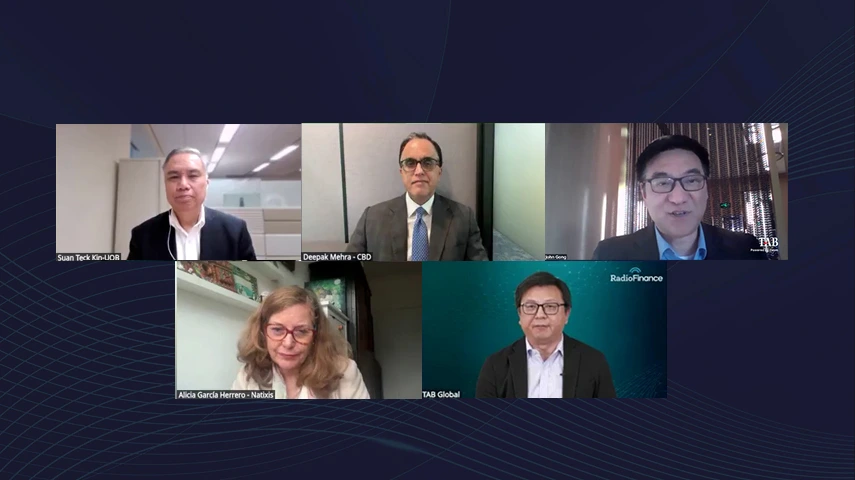During this RadioFinance session, we explored asset tokenisation and the digital asset world from the perspective of the global banking industry, highlighting key trends and challenges and how it is helping evolve finance.
In this RadioFinance panel, industry leaders from ANZ, Citi, and JP Morgan’s Onyx Digital Assets, discussed the transformative potential of digital assets and tokenisation. They explored the sweet spots for banks in the digital asset universe, the challenges of interoperability and industry adoption, and the future of finance with the convergence of centralised (CeFi) and decentralised finance (DeFi).
The digital asset universe is vast, encompassing cryptocurrencies, stablecoins, central bank digital currencies (CBDCs), tokenised assets, and more. For banks, the key areas of interest lie in tokenisation and the use of blockchain technology to enhance efficiency and transparency in financial operations.
Mark Attard (Mark), Head of Digital Assets and Client Engagement for Treasury and Trade Solutions at Citi, highlighted that banks have been exploring blockchain since 2016. The primary areas where digital assets are promising include trade finance, marketable securities, and the flow of funds. He emphasised that smart contracts and programmable money could significantly streamline operations and processing in areas such as trade finance, securities trading, and middle office functions, reduce the reliance on physical documentation, and improve operational efficiencies.
A significant challenge in the digital asset space is interoperability among different blockchain solutions. Nikhil Sharma (Nikhil), Head of Growth at Onyx Digital Assets, JP Morgan, explained that multiple financial institutions and fintechs developing their blockchain platforms lead to fragmented liquidity and client experiences. He discussed JP Morgan's efforts in testing interoperability mechanisms and collaborating with partners to create a unified ledger for tokenised assets. Hari Janakiraman (Hari), Head of Industry and Innovation at ANZ, added that standardisation, such as adopting Ethereum Request for Comments (ERC) standards for tokens, is crucial for seamless interoperability.
The regulatory landscape is also a critical factor in the adoption of digital assets. Hari noted that regulators globally are working to align existing financial regulations with the new digital asset frameworks. For example, the UK Electronic Trade Documents Act allows for blockchain-based digital assets in trade finance, illustrating progress in regulatory support.
Tokenisation is transforming how financial assets are managed and traded. Nikhil shared JP Morgan's success with Onyx Digital Assets, where they have processed over a trillion dollars using tokenised assets across various financial utilities. He highlighted the benefits of tokenising money market fund units and bonds, which enhances liquidity and enables new financial products and services.
Mark emphasised the potential of tokenisation to revolutionise corporate treasury operations by enabling near-instantaneous global liquidity movements and new investment opportunities. He pointed out that the tokenisation of marketable securities could eliminate settlement risks and enhance financial efficiency through atomic swaps facilitated by smart contracts.
The convergence of CeFi and DeFi is inevitable, with both sectors likely to integrate more closely as technology and regulations evolve. Hari envisioned a future where real-time payments and treasury operations become the norm, driven by the advancements in digital assets and tokenisation. Mark and Nikhil concurred, highlighting the role of interoperability and regulatory frameworks in achieving this convergence.
The panel concluded that while challenges remain, the ongoing collaboration between financial institutions, fintechs, and regulators will pave the way for a more efficient, transparent, and inclusive financial ecosystem. The future of finance lies in the seamless integration of CeFi and DeFi, leveraging the strengths of both to unlock new opportunities and drive innovation.
The panel also underscored the transformative potential of digital assets and tokenisation in building the future bank, where real-time financial operations and enhanced liquidity management become a reality.
Invited guests include:
The Asian Banker RadioFinance aims to enhance understanding of the finance industry globally by bringing together thought leaders, industry experts, practitioners and futurists to examine current, critical issues through a discussion facilitated by visual and web-based platforms.Through interactive technology, participants do not have to take time out from their crowded schedules or leave the comfort of their own desks.

As wallets, instant payments and embedded finance reshape how customers interact with payments across Asia Pacific, card issuance is often assumed to be losing relevance. David Lim of Alliance Bank Malaysia, Anshul Sabherwal of Standard…

Customers in Malaysia increasingly expect international payments to be as seamless as local transfers. At a closed-door roundtable convened by TAB Global with Visa, participants examined how banks are adapting to these expectations while…

The Japan Banking Innovation Conference 2025, held at The Westin Tokyo, convened over a hundred senior banking executives, fintech leaders, policymakers and technology pioneers to discuss the fundamental shifts redefining financial services.

As the global banking industry braces for a challenging 2025, it faces economic headwinds, geopolitical tensions, trade realignments, and the push for sustainability and technological innovation

The AWS Financial Services Symposium Singapore 2024 showcased how AI, data, and cloud technologies are revolutionising financial services. Industry leaders from AWS and HSBC shared insights into advancing innovation, regulatory responsibility…

By continuing to browse this website, you agree to our privacy policy.